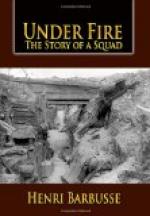Reluctantly the ashen dawn is bleaching the still dark and formless landscape. Between the declining road on the right that falls into the gloom, and the black cloud of the Alleux Wood—where we hear the convoy teams assembling and getting under way—a field extends. We have reached it, we of the 6th Battalion, at the end of the night. We have piled arms, and now, in the center of this circle of uncertain light, our feet in the mist and mud, we stand in dark clusters (that yet are hardly blue), or as solitary phantoms; and the heads of all are turned towards the road that comes from “down there.” We are waiting for the rest of the regiment, the 5th Battalion, who were in the first line and left the trenches after us.
Noises; “There they are!” A long and shapeless mass appears in the west and comes down out of the night upon the dawning road.
At last! It is ended, the accursed shift that began at six o’clock yesterday evening and has lasted all night, and now the last man has stepped from the last communication trench.
This time it has been an awful sojourn in the trenches. The 18th company was foremost and has been cut up, eighteen killed and fifty wounded—one in three less in four days. And this without attack—by bombardment alone.
This is known to us, and as the mutilated battalion approaches down there, and we join them in trampling the muddy field and exchanging nods of recognition, we cry, “What about the 18th?” We are thinking as we put the question, “If it goes on like this, what is to become of all of us? What will become of me?”
The 17th, the 19th, and the 20th arrive in turn and pile arms. “There’s the 18th!” It arrives after all the others; having held the first trench, it has been last relieved.
The light is a little cleaner, and the world is paling. We can make out, as he comes down the road, the company’s captain, ahead of his men and alone. He helps himself along with a stick, and walks with difficulty, by reason of his old wound of the Marne battle that rheumatism is troubling; and there are other pangs, too. He lowers his hooded head, and might be attending a funeral. We can see that in his mind he is indeed following the dead, and his thoughts are with them.
Here is the company, debouching in dire disorder, and our hearts are heavy. It is obviously shorter than the other three, in the march past of the battalion.
I reach the road, and confront the descending mass of the 18th. The uniforms of these survivors are all earth-yellowed alike, so that they appear to be clad in khaki. The cloth is stiff with the ochreous mud that has dried underneath. The skirts of their greatcoats are like lumps of wood, jumping about on the yellow crust that reaches to their knees. Their faces are drawn and blackened; dust and dirt have wrinkled them anew; their eyes are big and fevered. And from these soldiers whom the depths of horror have given back there rises a deafening din. They talk all at once, and loudly; they gesticulate, they laugh and sing. You would think, to see them, that it was a holiday crowd pouring over the road!




